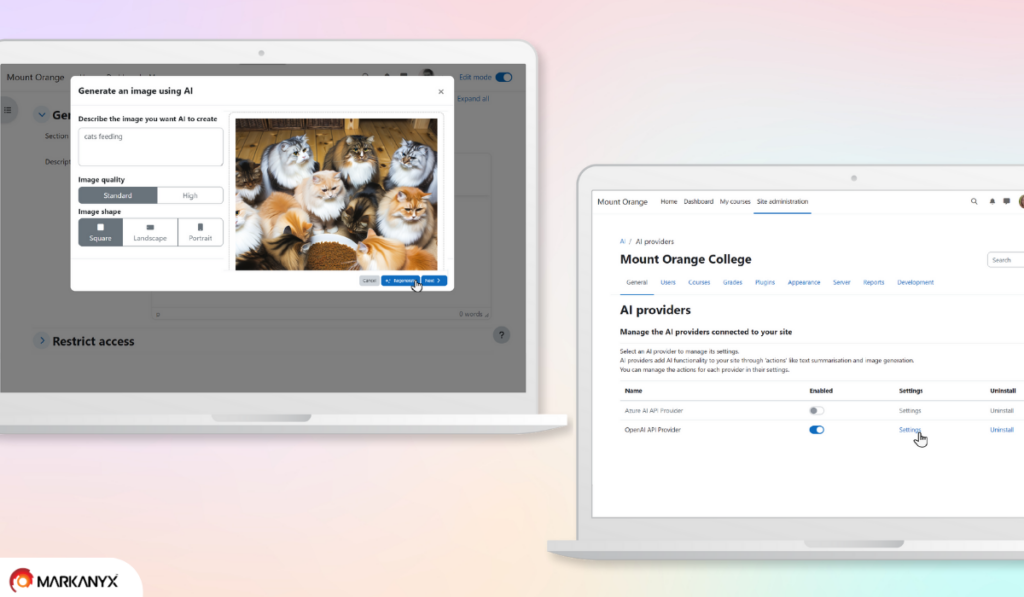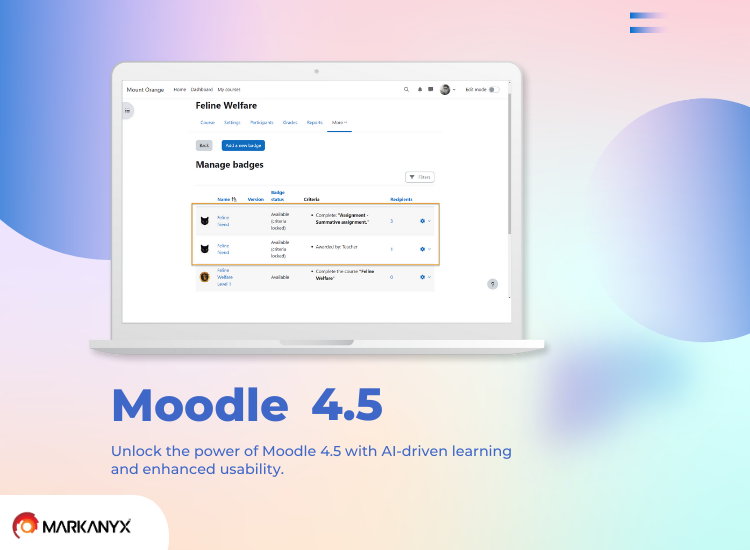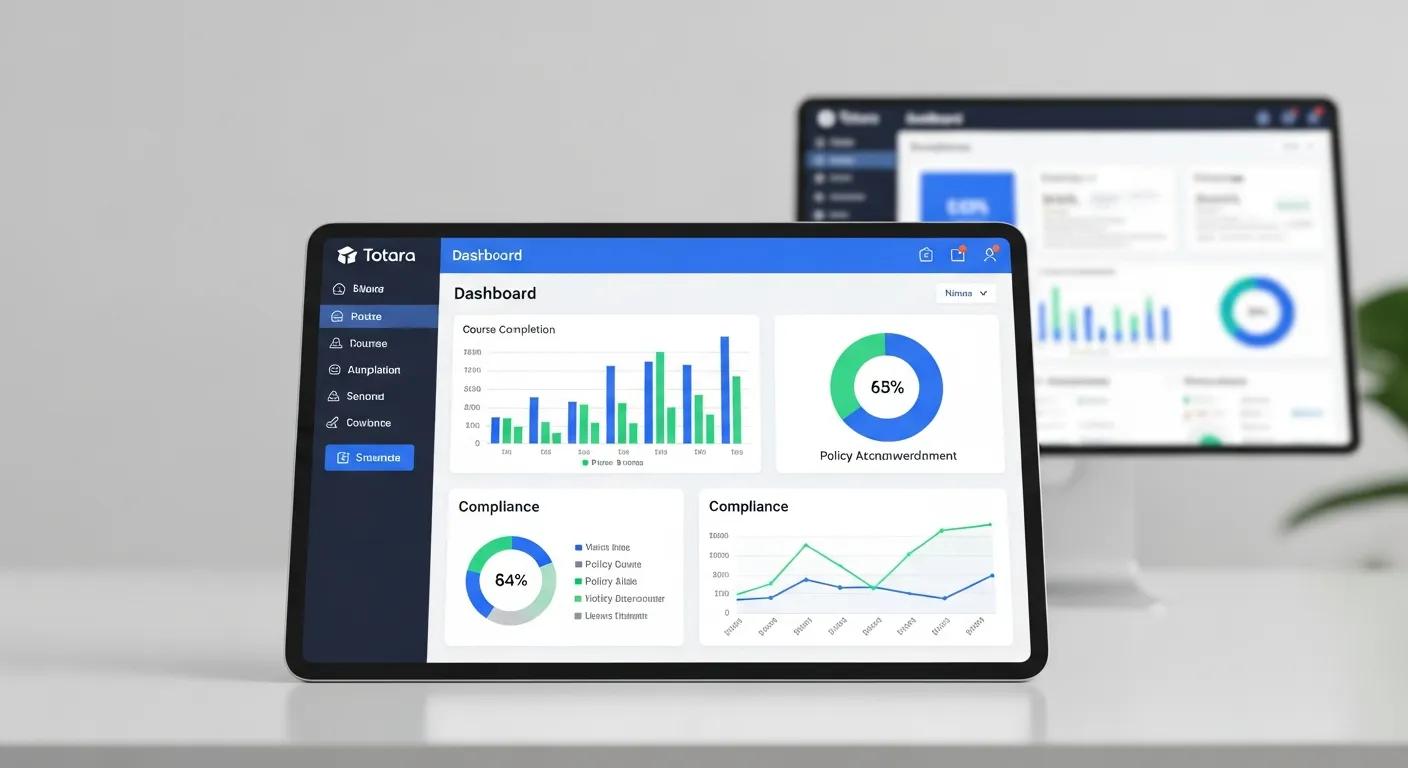In this detailed article, we will explore the latest features of Moodle 4.5, focusing on how they can be practically applied to improve the delivery and management of online courses. Whether you are a seasoned administrator or an instructor looking to maximize the potential of Moodle, the updates in this version offer advanced solutions to address today’s complex e-learning needs.
Introduction to Moodle 4.5: What’s New?
Moodle has long been a leader in the open-source LMS market, providing customizable solutions for institutions around the world. Moodle 4.5 takes this legacy further by integrating advanced AI capabilities and enhancing user-friendly features, solidifying its reputation as a forward-thinking LMS solution.
The key updates include:
• AI-driven personalization for learners
• Enhanced usability features to improve workflow efficiency
• Accessibility improvements to meet the diverse needs of global learners
• Security updates ensuring that the platform remains secure and compliant with modern standards
Let’s dive deeper into these key areas and discover how Moodle 4.5 can redefine the way you approach online learning.
AI-Powered Enhancements: Elevating Learning Experiences
One of the most transformative features of Moodle 4.5 is its AI-driven tools. These innovations are designed to create personalized and adaptive learning experiences for students, allowing educators to leverage technology in ways that were previously complex and resource-intensive.
AI-Driven Personalization
AI technology in Moodle 4.5 analyzes each student’s learning habits, progress, and engagement levels, delivering highly personalized recommendations. For example, it can suggest relevant learning materials, assessments, or courses based on a student’s past performance. This dynamic personalization ensures that learners are continually challenged and supported, enhancing engagement and reducing dropout rates.
Use Case: Imagine a student struggling with a particular concept. Moodle 4.5’s AI can recommend supplementary content or suggest additional quizzes tailored to that learner’s needs. This helps institutions foster a more individualized approach, which is particularly beneficial in large, diverse student populations.
AI-Generated Feedback
Instructors benefit significantly from AI-driven automated feedback systems, which analyze student responses to quizzes and assignments, providing immediate, actionable feedback. Not only does this reduce the time educators spend grading, but it also ensures that students receive timely and relevant insights into their performance.
Practical Application: AI feedback goes beyond simple right-or-wrong responses. It can identify common errors or misconceptions across students and offer explanations or direct them to resources that address those specific issues. This feature helps instructors maintain high-quality teaching standards without sacrificing time for more critical tasks like curriculum design or student interaction.
AI-Assisted Administrative Tasks
For administrators, Moodle 4.5 introduces AI capabilities that streamline course management tasks, from student enrollments to progress tracking. The AI can automate routine processes such as sending reminders for assignment deadlines or notifying students about new resources, further easing the administrative burden.
Benefit: For an LMS provider managing multiple clients, AI-assisted administrative tools can ensure that the platform runs smoothly with minimal manual intervention. This allows more focus on enhancing the overall learning environment.

Two screenshots of Moodle 4.5 showcasing new AI capabilities for image generation and seamless integration with third-party AI providers like Azure AI API and OpenAI API, enhancing content creation accessibility and management within the Moodle 4.5 LMS.
Usability Overhauls: Simplifying Course Management
With Moodle 4.5, the platform has undergone significant usability improvements, making it more intuitive and easier to navigate. These updates are especially beneficial for both educators designing courses and students engaging with the content.
Improved Course Editing
The new drag-and-drop interface for course creation is a standout feature in Moodle 4.5. It simplifies the process of building and arranging course materials, reducing the technical skills needed to develop interactive and engaging learning environments.
Example: An instructional designer creating a new course can now effortlessly move course elements—such as assignments, readings, and multimedia resources—without needing to dive into complex backend systems. This not only saves time but also encourages instructors to experiment with course design in ways that better suit their students’ needs.
Dashboard Customization
The customizable dashboard allows both educators and learners to tailor their experience, focusing only on what matters most to them. For example, instructors can configure their dashboards to prioritize grading tasks and student performance reports, while students can streamline their views to focus on upcoming assignments and quizzes.
Instructor Benefit: With a personalized dashboard, educators can optimize their workspace for efficiency, easily tracking student progress, grading assignments, and managing communication—all in one place.
Accessibility in Focus: Making Learning More Inclusive
A significant focus of Moodle 4.5 is ensuring that the platform is accessible to all learners, regardless of their abilities. In today’s diverse educational environment, accessibility is not just a feature—it’s a necessity.
Enhanced WCAG 2.1 Compliance
Moodle 4.5 is built to be more compliant with the Web Content Accessibility Guidelines (WCAG) 2.1. This ensures that users with disabilities can navigate, interact, and engage with course content more easily.
Feature Enhancements:
• Keyboard Navigation: Improved keyboard accessibility allows users to navigate Moodle without needing a mouse, which is crucial for learners with mobility impairments.
• Screen Reader Support: Enhanced screen reader compatibility ensures that visually impaired learners can interact with all elements of the platform, including quizzes, videos, and forums.
• Text-to-Speech Capabilities: AI-powered text-to-speech features help translate content into an auditory format, providing support for users with reading difficulties or visual impairments.
Real-Time Language Translation
For institutions with international students, Moodle 4.5 introduces real-time language translation powered by AI. This feature helps bridge language barriers, allowing students from diverse linguistic backgrounds to fully participate in the learning experience.
Ensuring a Smooth Transition to Moodle 4.5
Upgrading your Moodle platform to version 4.5 brings immense benefits, but it’s crucial to ensure that the transition is seamless and secure. Institutions relying on Moodle for their day-to-day learning activities must take the necessary steps to avoid disruptions during the upgrade process.
Conclusion: How Markanyx Can Help You Transition to Moodle ™ 4.5
As you consider upgrading to Moodle ™ 4.5, ensuring a smooth transition is vital. At Markanyx, we specialize in helping institutions migrate to the latest versions of Moodle ™ while safeguarding data and ensuring the platform operates without interruption.
Our team can assist you with everything from backups to full implementation, ensuring all new features are optimized for your institution’s needs.
Our protocol for a seamless upgrade:
- Backup Existing Data: Before initiating the upgrade, we ensure all course data, customizations, and user progress are securely backed up.
- Test the Upgrade in a Staging Environment: It’s essential to test Moodle ™ 4.5 in a controlled environment to identify any potential compatibility issues with existing plugins or custom themes and integrations (e.g., CRMs, SSO, HRIS, etc.).
- Communicate with Users: We inform educators and users about the new features and provide them with resources or training to familiarize them with the platform’s enhancements.
Contact us today to learn more about how we can support your upgrade to Moodle ™ 4.5. With our expertise, you can enjoy the full benefits of AI-powered learning, enhanced usability, and improved accessibility—while staying focused on what matters most: providing an excellent learning experience for your students.
Screenshot credits: Sonya Trivedi, Moodle





